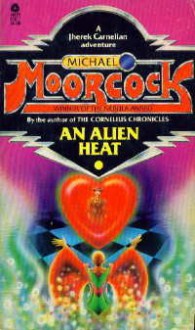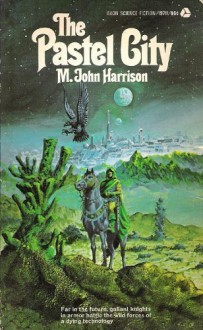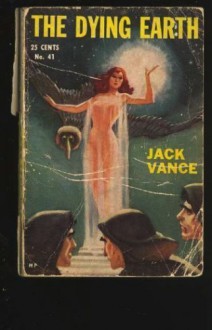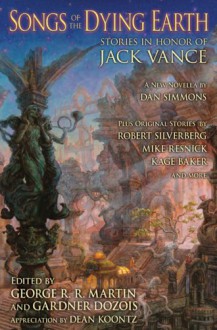
I love the idea of a throwback, an author who takes cues from classics and puts a new spin on them. Mieville took rollicking pulp and updated it, Susanna Clarke made fairy tales and the Gothic novel sing for a modern audience--but if you're going to write in the style of a bygone great, take only the best, and leave the dross.
By all means, copy Howard's verve and brooding, but skip the sexist titillation. Copy Lovecraft's cosmic horror, but skip the racist epithets. Dan Simmon's Ilium feels like a 50's sci fi story for all the wrong reasons--it isn't as much a throwback as a relic.
We're given several intertwining stories, all of which feature slight variations on the standard science hero, that idealized version of the author that we all roll our eyes at: the adventurer who is a bit dorky, a bit out of place, more at home studying Shakespeare or Ancient Greece in the safety of a library somewhere, but who has found himself stuck on Mars, or launched into space, or trapped in a dystopian conspiracy (respectively), and now must get through it by his smarts and good character.
As any sci fi reader has come to expect from such stories, the plotting is convenient--instead of being motivated by their own internal desires, the plot is just imposed upon the characters. They are vessels through which we experience a story instead of thinking, feeling creatures with their own desires.
The main plots roughly parallel a number of other classic sci fi texts. Like Riverworld , we have these powerful, advanced beings recreating humans and playing games with them, taking on the role of gods as they rebirth our species on another world. The next plot combines elements of Brave New World, and Dancers at the End of Time , where we follow a man on a dying, post-scarcity Earth as he tries to uncover who's really behind it all.
This latter story also has a more interesting antecedent in Nabokov's Ada --as several characters, images, and relationships are drawn from that work, yet it is not an expansion upon Nabokov's sci fi foray, but a regression of his themes back into titillating pulp. The main character just keeps going on and on about how hot his cousin is, and how he wants to sleep with her--however, since he is rebuffed and mocked at every turn, we have to assume that this is meant to be a satire of that style. Yet, we’re still getting those descriptions, we’re still getting that primary point of view, so I’m not sure Simmons is doing quite enough to differentiate the attempted satire from the object of ridicule. Likewise, it’s so overstated and repetitious that it becomes rather tiring.
The Nabokovian turn is a curious one, as it would seem to promise more depth and thought have gone into this work than the average genre adventure. One character lives in a Nabokov story, the next one has constant discourses on the meaning of Shakespeare's Sonnets and the philosophy of Proust, and the last is constantly remarking on literary interpretations of Homer. Simmons is aiming high, he's deliberately drawing comparison with the literary greats, trying to borrow depth and complexity from them--but it's not enough to simply invoke their names, to place their thoughts into the mouths of this or that character, if you fail to integrate these ideas fully into your structure and prose.
Simmons' languages is disappointing--overly explanatory, nitpicking in that familiar sci fi way, where everything is straightforward and reductive. The inner lives of the characters, their motivations, the finer points of the plot, all are stated outright, then rehashed and restated. The reader is told what to think, how to react, and what it all means, and it all becomes rather overbearing. Much of the bulk of this book (and it is bulky) comes from the fact that the author is not willing to leave anything well enough alone. At one point he mentions Hector’s son’s nickname and what it means twice in as many pages--at which point it started to feel like no one actually bothered to edit this thing in the first place.
A grand and strange idea needs grand and strange prose to propel it, trying to narrow it down and simplify it for the crowd just isn't going to do it justice. If you’ve decided to write an odd and complex book, with various story threads drawing on both classic sci fi and great literature, at a certain point you’re going to have to have faith that it will come together, in the end. Otherwise, the anxious urge to control every aspect and get it just right is going to strangle the life out of the thing, overproducing it until there is no room left for mystery or strangeness.
In bad fantasy, it often feels like the author has set themselves the masochistic limitation of constructing a book solely using words and phrases cut from an antiques catalogue--which would explain why, by the end, the swords, chairs, and cloaks have far more developed personalities than the romantic leads. Likewise, in bad sci fi, it feels like the authors were forced to do the same thing with an issue of Popular Mechanics--filling out the text with neat little gadgets and a blurb on the latest half-baked FTL propulsion theory.
We can go back as far as Wells and Verne and see the split between social sci fi and gadget sci fi: Wells realized that it was enough to simply have the time machine or airplane to explore as story devices, as things that might change society, and people. Sometimes, he would go on his preachy tangents, but they were always about the effects of technology, not particulars dredged from an engine repair manual.
Verne, on the other hand, liked to put in the numbers, to speculate and theorize about the specifics of the technology--and yet here we are, still waiting for the development of the kind of battery banks he describes as powering the Nautilus. Going into these intense particulars simply isn't necessary, not in a work of fiction.
A communicator or phaser or transporter is just as inspiring and fascinating on Star Trek without bothering with vague pseudoscience for how the thing is supposed to work. In the end, focus on the story itself, on the characters and the world, and leave out the chaff. The Nautilus is no more (or less!) interesting for a few paragraphs about its engine room, so as in all editing, if nothing would be lost by the omission, best to cut it.
It’s odd to still be getting this in the post-speculative age, where Dick, Ellison, and Gibson have already paved the way for the odd, literary, sci fi story--and whose works ended up being far more predictive of the future than any collection of number-crunching gadget-loving writers. Gibson didn’t even own a computer at the time he wrote Neuromancer , and certainly didn’t go into great detail about the technical aspect of ‘decks’ or ‘cyberspace’, but that didn’t prevent him from being remarkably prescient about how those technologies would change our world. It just seems so odd that now, thirty and forty years after the Speculative Fiction revolution, we should end up praising a regression like this.
Bizarre how much a modern sci fi novel ends up feeling like Tom Swift, with the character constantly mentioning his ‘shotgun-microphone baton’, ‘levitation harness’, and ‘QT medallion’--going into long theoretical digressions about how precisely his ‘morphing bracelet’ might possibly work, on the quantum level, allowing him to look like any person he has scanned--as if we care. And then, of course, he just gives up on it and says he doesn't understand it, after all--so then, what is the point of the digression?
You know you’re reading bad sci fi when the author takes a basic concept that we already understand and have a term for--like teleportation--and then invents his own, new term (or better yet, phrase) to describe the same thing. Sci fi authors can’t seem to get enough of that sort of pointless convolution, an extra layer of complexity that doesn’t actually add anything to the story.
Or they’ll have some other technology, and every time they mention a character using it, they feel the need to describe and explain it all over again. Sci fi is about tech, so of course you want that in there, but once a piece of technology has been established in a scene, you don’t need to reintroduce it every time--we’ll take for granted that the dude still has it and that it works in the same way.
If you want to write a book about robots reading Proust, that’s fine--but don’t then turn around and treat the audience like a bunch of mouth breathing idiots who need to be reminded what X gadget does even though it’s the fifth time we’ve seen it.
Beyond that, the technology in the world makes no sense--they have advanced in huge steps in things like teleportation and energy conversion, and seem to be able to create whole new people and races from thin air, and yet their ability to heal injuries is extremely limited, slow, and cumbrous. It makes it difficult to believe that this book was published as recently as 2003.
Then came that fateful phrase upon which so many a sci fi and fantasy review has turned:
And then there's the depiction of sexuality. It feels quite adolescent--physical instead of emotional, women described at length and men not at all--and not just in the Ada section, where it makes a certain sense as an homage, but throughout the book.
Strip it down to the bare facts of the description, and it becomes the sort of erotica Beavis and Butthead would come up with:
Beavis: So this chick is like, in the bath, and she’s totally of touching her boobs.
Butthead: Yeah, and she’s super hot. And then she stands up, and she’s naked.
Beavis: Whoa, that’s cool!
Butthead: And then she puts on a robe, but you can totally see through it.
Beavis: Heh heh, that’s good, Butthead. And then, she like, rubs her boobs on a pole.
Butthead: Huhuhuh, and then she rubs her thigh on the pole.
Beavis: Like, her inner thigh …
Butthead: Yeah. And then she goes over to this dude, and she takes off the robe, and she’s, like, totally naked!
Is this list of body parts supposed to be arousing? If you were an alien learning the ways of human culture through sci fi novels--firstly, I’m sorry--and secondly, you could be forgiven for assuming that a 'woman' was like any other human being, except that all her limbs had been replaced by breasts, and all her locomotion was achieved by squishing them together and pressing them against things. Is this what passes for seduction? Just 'here’s my naked body, have a go'?
A few chapters later, the same characters are forced to undress together (because 'reasons'), and so we get this long, loving description of what the ladies look like, what the young man is thinking while looking at them, how naughty and exciting it is--and yet, despite the omniscient third-person narrator, no description of the men undressing, nothing about what the women might be thinking, what their point of view might be. One of these women is probably the closest we have in this book to a strong female character, and yet we only experience her through the eyes of a chubby, ignorant dude who keeps trying to sleep with her.
Later on, we get a scene that is ostensibly about her desire, about someone she desires to sleep with--and yet, once again, the whole thing is painted in terms of what she looks like, of her body, of how a desirous man might see her--even though we’re not actually invited into his head to hear his thoughts, how he feels about her. It’s such a blatant contradiction of point of view: the focus on female physical attractiveness is so pervasive that female characters cannot have sexual thoughts or desires unless they are presented in terms of what their own physical beauty looks like.
Since we don’t end up getting an insight into his desires, and neither are we allowed to understand her attraction, or what draws her to him, and yet the description keeps turning back to her breasts and skin and hair, the consummation ends up feeling less like carnal fulfillment and more like smacking two dolls together--except the child has only bothered to undress Barbie.
Then we get to the scene that convinced me to give up on this book entirely.
So, our mooky, bookish hero has been led around by the nose for a few hundred pages, thrown into the plot without any choice in the matter and maneuvered from one scene to the next--until finally, he starts to see that unless he changes his current course, it’s not going to end well for him. At last, he starts to exercise some free will, to play the role of active agent in this book instead of just a passive observer. So, what’s the first thing he decides to do? That’s right, rape a woman. That’s the first decision he makes, the first thing he does that he wasn’t directly made to do by some greater power.
But hey, at least it’s not a violent rape--no, he’s too mild-mannered for that. Instead, he just uses his super science gizmo to make himself look like her husband and then orders her into bed--though he’s so nervous he can barely get the words out, because he’s one of those shy, bashful rapists--you know the type.
He also talks about how many times over the years he spent hanging out in disguise outside her window, just watching her and thinking about her--and then makes a joke about ‘the boobs that launched a thousand ships’, because there’s no better time for humor than when you’re about to sexually violate a stranger. Of course, he remonstrates himself for being a ‘jerk’ for thinking something so inappropriate and crass, because he’s so mild-mannered and sweet--though this momentary self-awareness in no way slows down his rape plans.
And it’s not like up to this point, he’s been some intriguing, fraught, conflicted character who the author has built up to be morally questionable, someone the reader has to think about and whose actions we must come to terms with. No, so far he has been the most generic reader stand-in, a pure observer of the action (that’s literally the character’s job), just a standard nerdy sci fi protagonist who barely has a personality.
To switch immediately from such a flat character to such a fraught moral situation just doesn’t work. I’m not saying authors shouldn’t explore sexual assault, or the type of person who commits it, but in order to actually deal with that idea, you have to first build up the characters to the point where they have sufficient depth to actually delve into that theme in a meaningful way. Otherwise, why include it at all?
There’s no reason I can see that this scene couldn’t have just been a normal sexual encounter. The assault doesn’t add anything to the book, and as soon as it’s over, the author seems happy to just whitewash it and ignore it. Indeed, the victim realizes what’s happening and doesn’t care in the least, then immediately starts questioning her rapist about other things--and after that, happily has sex with him a couple more times.
Is this supposed to excuse it, somehow? Like, if a guy fires off a gun into a house that he suspects is full of children, and then we later find out that it was empty, is that supposed to make him somehow less reprehensible? 'Oh, no one got hurt, so everything's okay--move along.'
If it doesn’t provide new understanding of the main character (or of the victim), and the author is happy to ignore the fact that it happened at all, and just move on with the plot, then what was the point? Why include it at all? Perhaps it’s just exploitation, just pure titillation--which is a hallmark of cheap, thoughtless sci fi. And yet, here’s an author who spends large sections of chapters having characters discuss Shakespeare’s concept of love, or Proust’s--so clearly, Simmons is attempting to present himself as thoughtful and deliberate.
The problem is, if you don’t actually bother to explore those themes through your characters, their personalities and actions, then it simply doesn’t matter how often you have them lecture the reader on the subject--because all you’ve managed to do is write a book that tells us one thing, but then have the actual character actions contradict what we’ve been told. It’s like having a protagonist who the supporting cast constantly praises for being smart and clever, but then every decision he makes ends up being short-sighted and thoughtless.
Maybe it’s supposed to be some kind of cosmic frat bro slut-shaming logic. In the preceding scene, the victim gives this whole long speech about what a whore she is, how the current conflict is all her fault, and how she’s been sleeping with these different dudes because she just can’t help herself, and then she seems to be trying to seduce her husband's brother. So perhaps we’re supposed to sit here and think ‘well, this is all her fault, and she’s just been whoring around for years, causing all this trouble, so really she’s asking for it’
And yet, as any genre fan knows, that's clearly not the worst you can expect--indeed, while Simmons' portrayal of sexuality is one-sided, it's not deliberately so, like so many writers--he's not lecturing us on the inferiority of women--it's just blandly and thoughtlessly sexist. Beyond that, the reader can see that Simmons is trying very hard to do something here, and between that and the passably interesting turns of the plot, it was almost enough to keep me reading. The concept itself should make a fascinating book--this hyper-tech recreation of the Trojan War on Mars, interconnected with Nabokov's 'Antiterra'.
All Simmons' overt connections with literature are meant to establish a place in the canon--just as his genre has been trying to do for a century--perhaps that's why this book was shortlisted for awards, and has been widely praised, because of its obvious attempt to connect to Great Works. And yet, it makes the same mistake as any bad writing: trying to force through repetition and overstatement instead of doing all the difficult work of integrating those ideas into the book. Simmons just isn't doing enough, it's lip service, and the approach is just too rudimentary, flawed, and old-fashioned.
This isn't a forward-looking book, as sci fi should be, its a weirdly nostalgic attempt to redeem the past of sci fi, despite how goofy, exclusionary, and horribly Gernsbackian it was. Certainly, we should take lessons from the past, but good sci fi is always searching out the new thought or experience, exploring what it is to be human, and what it might be like in the future--the scree of gadgets are just a distraction, the same urge some shallow folk have to get the newest iphone, the day it comes out. That isn't a mind seeking the future, it's one trapped in the ever-consumptive obsession over the present, the self, the now.
And I get it, because running on that treadmill feels like moving (especially when you buy a new, cooler treadmill every year) but all that lurching and twitching and shivering is nothing but an ague, and it'll drain you in the end.

 Log in with Facebook
Log in with Facebook 









